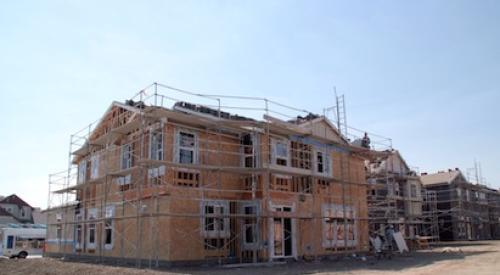It was a cold Chicago winter day in early 1989 when I first heard a disagreement erupt about which job is toughest in home building. It started in an operations meeting with David, the sales manager, expressing frustration that everything defaulted to the whims of construction and no one truly understood how hard it is to sell. Ron, a project manager, tiring of the constant tweaks requested by sales, leaned back in his chair and proclaimed, “That’s how it should be. If we don’t build it, you got nothin’ to sell,” and went on to describe how his guys spend all day juggling suppliers, trades, inspectors, management, and the Prussian Army while the sales folks just hang out in the model all day, warm and dry, reading People Magazine, then cash big checks for “taking orders.” Whoa! It quickly got ugly, with sales coming back with its lineup of crosses to bear and how construction hampers the sales folks at every turn.
Tim, one of the land development guys, had been sitting back waiting for his shot and now leaned in, “Well, if we don’t get you the lots, you can’t build [pointing at Ron] and you can’t sell [pointing at David], so what’s the point?” Now came JT, the controller, who dropped this bomb: “I call BS on all of that. If we don’t get the money lined up, nothing happens. Dead in the water.” The warranty manager laughed and just asked a question, “OK … any of you want to take one of my warranty guy’s jobs, or even think you could do it? No volunteers? Case closed!” At that point, Dan, the division president, declared the discussion pointless and called for a 10-minute break.
What Rolls Downhill
Those are real names I mention, and I hope I get an email or phone call from a couple of them who recall that conversation 27 years ago. But that debate is probably lost among the countless similar verbal battles that have occurred over the years—and no doubt continue to occur—at every home building company across the nation.
Was Dan right? Is it a pointless discussion? I’ve personally been through multiple iterations of discovering what I consider the toughest job in home building. For many years I felt it was warranty service. Those folks are at the back end of everything, and we all know what “rolls downhill.” Warranty service gets up each day to face the onslaught of the ever-growing accumulations of product and process failure that end up sitting in a customer’s family room, stinking up the place. And they’re expected to remedy everything quickly—with a smile. Warranty service never gets calls from homeowners telling them how happy they are with everything about their new house, while strains of Stevie Wonder’s “I Just Called to Say I Love You” play in the background. No, the calls only come when people are at best concerned, and more often are upset or even scared. Hundreds of studies show that a company’s reputation—in any industry—is largely based on a firm’s response to things gone wrong, even to the point that when handled exceptionally well, a service problem can result in a net gain in customer satisfaction. The downside is that these same studies show that bad news spreads further and faster than good news at the ratio of 12, or even 15, to 1.
 In short, the stakes for warranty service are huge, yet for most builders, these indentured servants are near the bottom of the totem pole. Don’t believe me? Just ask the warranty service staff. They get little support and even less respect. As a Lean Process devotee, I am the first to scream that the No. 1 solution is upstream prevention that reduces the need for service. Yet, with a product that has more than 100,000 parts and is built by 300 to 400 people outside in the weather over a period of three to six months (or more), well, things are bound to go wrong at some point.
In short, the stakes for warranty service are huge, yet for most builders, these indentured servants are near the bottom of the totem pole. Don’t believe me? Just ask the warranty service staff. They get little support and even less respect. As a Lean Process devotee, I am the first to scream that the No. 1 solution is upstream prevention that reduces the need for service. Yet, with a product that has more than 100,000 parts and is built by 300 to 400 people outside in the weather over a period of three to six months (or more), well, things are bound to go wrong at some point.
What we have is an industrywide army of people who work their tails off without much appreciation, fixing everyone else’s problems. It’s a tough job, indeed. I was discussing this with Todd Hallett, trusted colleague, founder of TK Design & Associates, and formerly the CEO of a 200-plus-unit production builder. When asked his choice for the toughest job, Todd immediately cited warranty service and detailed a litany of obstacles that matched my list above. Todd concluded, “This was always the burnout position at our firm—they didn’t last long, and it turned many good employees into bad ones.”
The Supers Have It?
After a time, however, I began to see the field construction superintendent as having the toughest job primarily because of the sheer number of people with whom he or she must interact. Our field guys at TrueNorth spend all of their time working with teams of builder personnel from all functions in our Lean Process implementations, so I thought it would be enlightening to get their take on this.
Kent Hogan, with more than 40 years of experience doing everything from assistant superintendent to custom builder to VP of operations at a major production builder, was quick to cite the superintendent job (or builder, project manager, construction manager—whatever term you use) as the toughest. He offered this compelling list of what supers are required to do:
• Directly manage more people than anyone else in the organization;
• Answer to both management and the customer;
• Be strong and aggressive enough to deal with the “field” mentality, yet soft and polished enough to build a relationship of trust with the customer;
• Deal with unreasonable building inspectors daily;
• Adjust on-the-fly for unpredictable weather.
Eric Timmis, another long-time TrueNorth associate and a professional engineer who also possesses about 40 years’ experience, added, “No contest. For me, it’s the superintendent. They deliver ‘jewelry,’ despite weather, unpredictable labor, materials that move from soil to roof, and everything in between. The customer is watching them like a hawk. The information they need is rarely bulletproof and is seldom on time. Every other work function is quick to blame them for any and all errors or delays. They are expected to master all the digital tools and also to practice top-level personal skills when present with buyers. And did I mention windshield time, flaky salespeople, whimsical executives, lazy engineers, maniacal city inspectors, and the constant threat of OSHA violations?”
 There is real truth in all of that, and I’d place even more emphasis on the biggest field “super” challenge of all: managing and taking responsibility for the work of 30 to 50 suppliers and trade contractors with 250 to 400 people who show up on the jobsite in the course of building a home. Mike Kozlowski of Apex Engineering, who we use on our Eastern U.S. consults, summed it up this way: “The project manager is tasked with overseeing multiple projects that are complex, with an all-too-often convoluted process and a fantastic number of potential pitfalls. It has been said that doing good work is one thing, but producing good work through others is the real challenge. Now add a tight timeline with product the super didn’t purchase, installation that others perform, and make him responsible for all of it.” Tough job? No doubt about it. But toughest?
There is real truth in all of that, and I’d place even more emphasis on the biggest field “super” challenge of all: managing and taking responsibility for the work of 30 to 50 suppliers and trade contractors with 250 to 400 people who show up on the jobsite in the course of building a home. Mike Kozlowski of Apex Engineering, who we use on our Eastern U.S. consults, summed it up this way: “The project manager is tasked with overseeing multiple projects that are complex, with an all-too-often convoluted process and a fantastic number of potential pitfalls. It has been said that doing good work is one thing, but producing good work through others is the real challenge. Now add a tight timeline with product the super didn’t purchase, installation that others perform, and make him responsible for all of it.” Tough job? No doubt about it. But toughest?
Flip-Flop
Lately my view has changed again, and I can make a good case that the hardest job just may be that of purchasing and estimating. There are two things these folks must have but almost never get: First, they rarely get all the information—final plans, elevations, specifications, and options and selections—to firmly nail down costs, contracts, and scopes with suppliers and trades. Second, they don’t get sufficient time to do their job. Yet the solution is not simply to give them more days; the solution is for management to make a final decision on exactly what’s being built, where, and at what spec level and to stick with it.
When it comes to those two things, I’ve asked hundreds of purchasing and estimating staff over the years about them and I can count on one hand the number who have answered yes to getting both. In Todd Hallett’s response to my question about the toughest job, purchasing and estimating was a “close second,” he said, adding that purchasing faces three big obstacles: “The boss always thinks you pay too much, many superintendents have sacred cows and don’t give new trades a chance (resulting in a high failure rate), and meanwhile the trades complain that they don’t get paid enough.”
Charlie Scott, another long-time colleague now working with builders at Woodland, O’Brien, & Scott but formerly a VP of both sales and operations for a large Indiana production builder, went right to the same place when I posed the “toughest job” question to him. Charlie’s take was, “The toughest are internal support jobs, including CAD and purchasing and estimating. Sales is self-rewarding, as they get to ‘eat what they kill’ and are recognized for sales on a monthly basis. The field has severe challenges, but they too usually get an activity bonus for what they build. The sharpest quality-minded companies establish a clear mandate that the field priorities are 1) quality, 2) budget, and 3) schedule. Frequently, though, senior leaders push different priorities for internal operations, most often 1) schedule, 2) budget, and 3) quality. Exactly backward. Management takes five to six months to refine a new plan, then requires purchasing and CAD to turn these plans, specifications, and pricing around in one-fifth of the time that management took to draw the initial lines.”
Charlie added an important data point to support his observation: “When our firm runs employee satisfaction surveys for builders, it’s common for internal support staff to have the lowest morale. Unlike sales or construction, they don’t have weekly meetings, they rarely get a performance bonus, and they’re almost never celebrated. They usually rate communication as lowest in the company and, ironically, they’re physically closest to the senior managers. No, the internal staff is too often an afterthought.”
At this point, it occurred to me that no one had thrown the sales function into the mix as “toughest,” so I queried Bob Schultz, sales and marketing trainer and consultant. His reply was quick and succinct, “Building and maintaining a high-performing sales team is the toughest job in home building. Why? When the market is good, we don’t pay attention to the sales we are missing. Regrettably, most salespeople—even those who appear to be selling effectively—if mystery video-shopped, would not, I repeat, NOT demonstrate a good process. If you doubt this, have them mystery video-shopped immediately!”
I can always depend on the TrueNorth team to suggest something that I hadn’t thought of, and this one comes from Hal Peller, our associate who ran his own remodeling company in the boroughs of New York City for more than 20 years. “The toughest job in home building: the painter. He’s the last in, and he has to fix all other trade damage, such as scuffed-up baseboards and patching where no one could find the electrical box covered by drywall. Then he has to keep coming back because the wood moves and nails pop. Meanwhile, the homeowner finds fingerprints and dings that the mover caused but expects the builder to fix anyway, usually at no additional charge.” I hadn’t thought of including trades on this list, and we can think of many others who have truly tough jobs. Flooring may just top my list.

Another Take
So we’ve pretty much covered the gamut, and although we haven’t gone into detail on finance or land, which were mentioned earlier, it wouldn’t be hard to scare up a strong advocate who believes that one or the other of these has the toughest job. Interestingly, when I sent out my email asking for input, I was thinking in terms of specific positions, such as a superintendent or purchasing manager, as opposed to functions that are more broadly performed. Yet several of my respondents took it exactly that way. Eric Tiffin, also from TK Design, contributed this: “The toughest job in home building is getting everyone on the same page … to coordinate with one another.” Can I get a witness? And this one from our West Coast engineer, Tim Garrison (aka, the Builder’s Engineer): “There is no doubt that the most difficult job in home building is finding and retaining good people. The reasons are obvious, but the solutions are not. No. 1 is to create an attractive culture. People are motivated more by culture than by money—that’s a proven fact. The workplace needs to be fun and interesting. Management needs to exude integrity, both personally and professionally. Daily goals must be quality-driven. Young talent must be constantly mentored. This is all the responsibility of management.”
I’ll finish with this from Tom Noonan, another long-time TrueNorth associate with decades of experience. He took me completely by surprise with this: “The most difficult job of all is the support staff at all the supplier and trade contractor organizations. They have to keep plates spinning for their own company plus all the different systems for their home builder clients.” This stopped me in my tracks. Those folks have to continually interact with the communication protocols, computer systems, and completely unique processes for plans, bid packages, start packages, POs, VPOs, and scheduling from 10, 20, or more builders. Stop and contemplate that for a moment. I think I just changed my mind—again.
In summary, there is clearly a lot of competition for the toughest job in the business, with challenges, obstacles, roadblocks, and conundrums enough to make anyone question his or her career choice. Failure in any one of these jobs can mean failure for the entire company. And now it dawns on me that there is one incredibly difficult job that hasn’t yet been mentioned: the senior manager who must each day support all of these folks in their tough jobs. There are innumerable priorities and distractions for those at the top, yet there is absolutely nothing a boss can do that’s more important than to make all of these difficult jobs easier. Is that the toughest job of all?
---
Scott Sedam is president of TrueNorth Development. For a PDF of all the articles in the series “Solving the Trade Shortage,” send email to info@truen.com and include “Trade Shortage” in the subject line. Scott welcomes your direct feedback to scott@truen.com or 248.446.1275.













